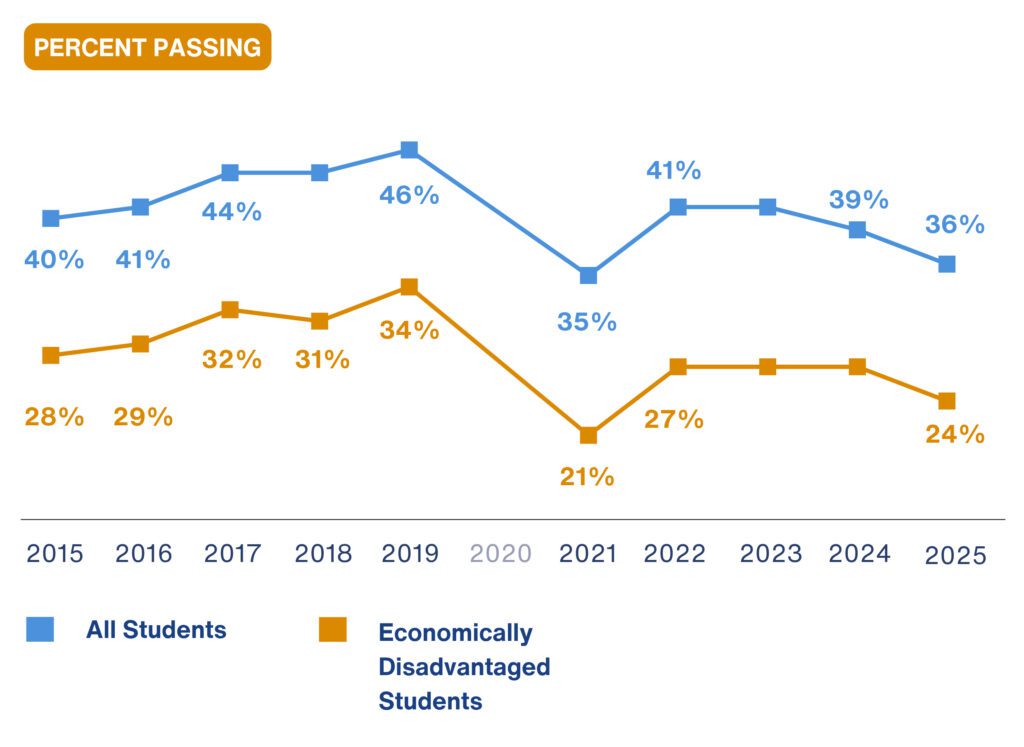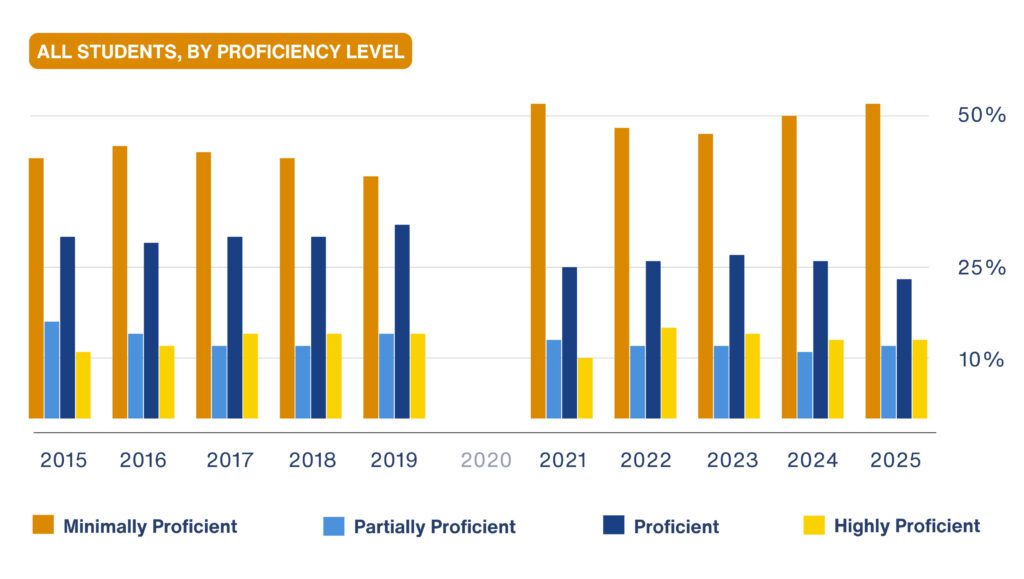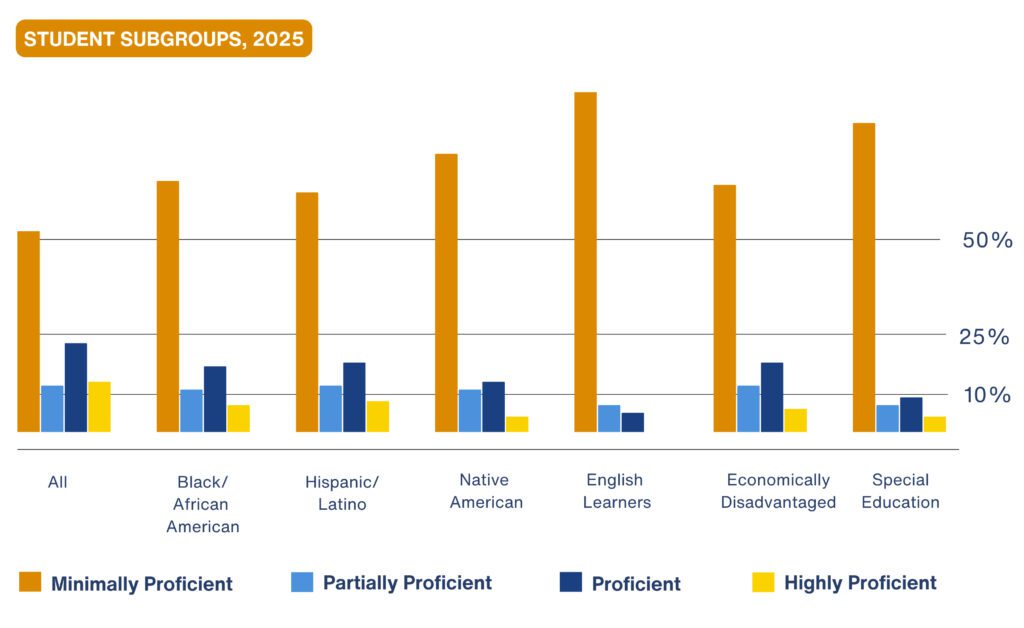Literacy Landscape
National Assessment of Educational Progress (NAEP), Fourth Grade Reading
Arizona
Southern Surge
In recent years, four southern states have demonstrated consistent and exceptional progress in early literacy, as measured by fourth grade reading scores on the National Assessment of Educational Progress (NAEP).
Mississippi was the only state to see gains across all performance levels over the last decade. Its average went up, and so did the scores of its highest and lowest performers.
4th Grade NAEP 2024
Mississippi: Policies and Strategies
- Statewide training for teachers in the science of reading instruction and intervention.
- Literacy coaches provide training and support for educators.
- Ongoing communication with parents and individual reading plans created in collaboration with parents for students found deficient in reading.
- State investments in Pre-K, kindergarten entry assessment, and full-day kindergarten.
- Retention for third graders not meeting reading score for promotion.
Mississippi pioneered literacy coaching in 2013 sending coaches to its lowest-performing schools. At the height of scale, 75 coaches were deployed across the state.
In 2024, Louisiana performed better than it had in 2019, making it one of the rare places to see academic recovery. It was one of only two states to avoid a COVID dip in reading scores.
4th Grade NAEP 2024
Louisiana: Policies and Strategies
- Improved knowledge-building curriculum.
- All K-3 educators required to have training in the science of reading.
- New literacy screening and parent notification.
- High-impact tutoring.
- State investments in Pre-K, kindergarten entry assessment and full-day kindergarten.
- Retention for third graders not meeting reading score for promotion.
In 2013, the state began doing curriculum reviews. Since 2016, all schools have been required to use high-quality instructional materials. The state provided free professional learning workshops for specific curricula.
Tennessee learned from both Mississippi and Louisiana and took the best of both models.
4th Grade NAEP 2024
Tennessee: Policies and Strategies
- Reformed and improved knowledge-building curriculum along with a free foundational skills curriculum available to all schools; in 2020 all schools adopted HQIM from approved list to receive state funds.
- DOE developed its own streamlined training for teachers; nearly all educators trained in the science of reading in less than three years.
- High-impact tutoring.
- State investments in Pre-K, full-day kindergarten.
- Retention for third graders not meeting reading score for promotion.
Through its Reading360 initiative, the state trained more than 45,000 teachers or 70% of all of its teachers effectively in the Science of Reading in less than three years. (2020-2023)
Alabama was one of only two states to show NAEP growth in 4th grade reading since 2019. In 2019, Alabama ranked 49th for fourth-grade reading, and today it ranks 34th.
4th Grade NAEP 2024
Alabama: Policies and Strategies
- Statewide training for teachers in the science of reading instruction and intervention.
- Literacy coaches provide training and support for educators.
- All schools must use a foundational skills curriculum from approved list to receive state funds.
- Lowest performing readers sent to literacy summer camps for 60 hours of intervention in the summer.
- State investments in Pre-K, kindergarten entry assessment, and full day kindergarten.
- Retention for third graders not meeting reading score for promotion.
In one year, the state provided summer literacy camps for more than 30,000 struggling readers, catching half of them up to grade level.
State by State Comparison
Arizona Academic Standards Assessment (AASA), Grade 3, English Language Arts
All Students

All Students

Student Subgroups, 2025

Arizona Chronic Absence Rate
Grades 1-8
Chronic absence rate is the percentage of students missing 10% or more of school year for any reason.
Source: AZ School Report Cards/Arizona Department of Education
Arizona Policy: Move On When Reading (MOWR)
- Move On When Reading is our state’s K-3 reading policy, which helps public and charter schools provide effective, evidence-based reading instruction for students in kindergarten through third grade and identify and support students with reading challenges as early and effectively as possible.
- Funding to support all public and charter K-3 schools to promote evidence-based reading instruction and early intervention.
- To receive MOWR funds, each school district and charter school is required to submit a literacy plan annually to ADE.
- Funding must be used to support K-3 reading through:
- Staffing
- Materials
- Assessment
- Professional Development
Milestones That Support Early Literacy
“Improving literacy rates is a requirement for building a qualified workforce for the future, keeping the United States globally competitive and ensuring broader economic opportunity.”
Why Reading Matters - Now More Than Ever
Business Roundtable (2016, 2020)
